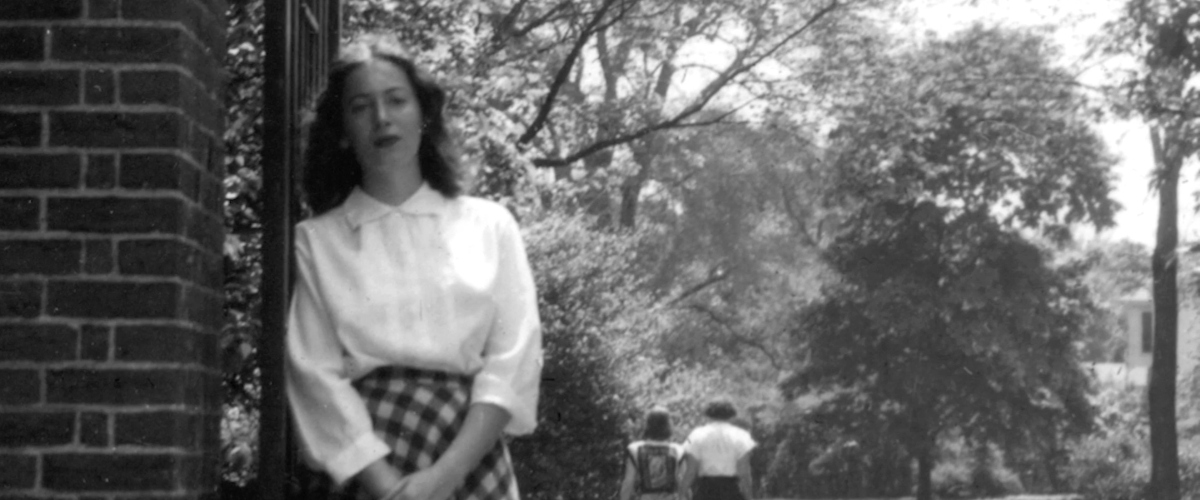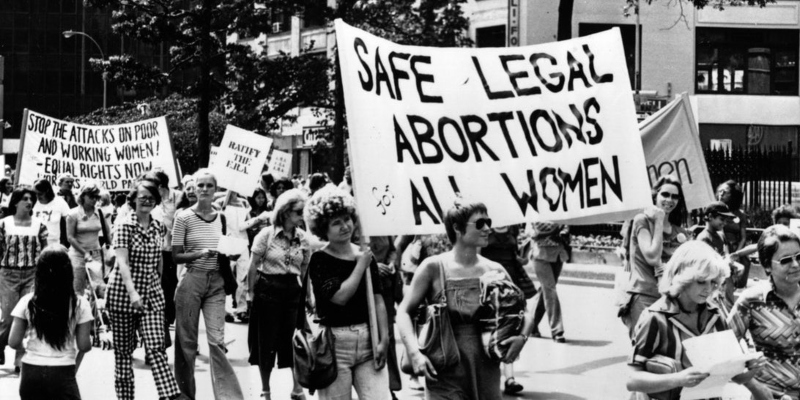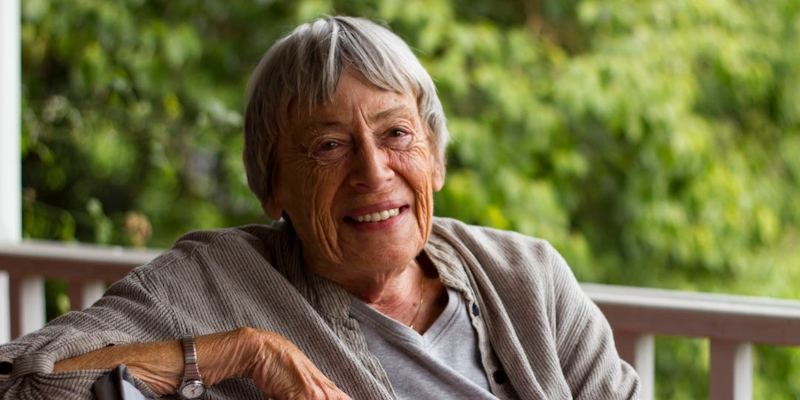
WATCH: Ursula K. Le Guin on Her Illegal Abortion in 1950
“I beg you to see what it is that we must save, and not to let the bigots and misogynists
take it away from us again.”
The Journey That Matters is a series of six short videos from Arwen Curry, director and producer of Worlds of Ursula K. Le Guin, a Hugo Award-nominated 2018 feature documentary about the iconic author.
In the first of the series, Elisabeth Le Guin and Caroline Le Guin reflect on “What It Was Like,” in which Ursula reads from her essay of the same name about the illegal abortion she had while studying at Radcliffe.
As young women growing up under the protection of Roe, we never really talked with our mother about her abortion. Elisabeth learned that it had occurred when she went through several abortions of her own in the 1980s; but what we know about the story of Ursula’s necessarily different experience comes to us through her written words, as it does to you. “The Princess” was her keynote address to NARAL Pro-Choice America in 1982 when Roe was not even a decade old, and this piece, “What It Was Like,” was a talk for Oregon’s NARAL chapter in 2004. These stories are public statements, performances of Ursula’s own life material as a means to inspire and transform. The second of them, which you are about to hear, is also a rather extraordinary public love letter to her own family.
This is a hard essay to read or listen to, and it’s meant to be. Clearly, it was hard to write; watching Ursula in her 80s read her own words aloud, more than a decade after she wrote them, the emotion is palpable—and that shy little shrug at the end, that letting go. For us, it’s hard to watch. It’s a hard thing to think about your mother having an abortion, and an illegal one at that—to do so takes you to an exquisitely painful, vulnerable place, imagining what she went through: the shame, the grief, the sense of loss she must have experienced, the lingering, corrosive doubt. A hard thought exercise, but necessary to fully honor the fact that she could later choose to carry you to term, bring you into the world, into her world, to love and mother you the way she wanted to mother.
Being a mother was as essential to Ursula as being a writer. They were two fundamental streams of her being, wholly distinct but also quite inseparable. To call them twin aspects of her “creativity” would be to use a word she disliked, for the way it elides the complexity of human work. Yet complexity certainly existed in the deep, perpetual tension between her two vocations, even as they nurtured one another. Nevertheless, she is clear about the early events that made possible her passionate lifelong wrestling match with that tension: neither we, her beloved children, nor her extraordinary body of imaginative work, beloved by so many, would exist had she been forced untimely into motherhood—forced to become “another useless woman.”
It’s hard all over again to engage with this essay knowing that today, after that reprieve of “half a lifetime,” abortion is again illegal in this nation. The dark ages are back: in Texas, Idaho, North Dakota, Tennessee, and more than a dozen other states, pregnancy can now mean facing the prospect of being forced to bear children against one’s will—bearing them “for the anti-abortion people” (who will have nothing to do with helping care for those children). Those who have the privilege and means, as our mother did over 70 years ago, may make the ethical choice to break the law, to have or not have children for themselves; they may have loving family members and find medical professionals willing to risk being criminalized by supporting them. Most do not have this choice, however. Somewhere in Missouri or Idaho, a young person with the capacity to imagine the wider realities we so desperately need, the burning potential to become a transformative storyteller, is being shamed and shoved into the silence of enforced motherhood.
Ursula’s words won’t let us forget what it was like and what is at stake for us all, all over again today. As her daughters, our words here, our voices, our very bodies would not be if our mother had not had the support and the courage to stand up for her own body and mind and heart, and for the possibilities of ours. Our existence embodies the legacy of her fierce love and her fiery and beautiful resistance.
—Elisabeth Le Guin and Caroline Le Guin
*
Further reading:

How Women Writers Speculated Fictional Futures Free From Patriarchal Control
“Feminist science fiction authors were… bound together by a shared set of goals, using their art to demonstrate the limits of patriarchal culture and articulate the possibility of more egalitarian alternatives for all.”

What Contraception Meant to a Century of Women Writers
“The great 20th-century mother-writers and -artists whose work towers above us now—Doris Lessing, Toni Morrison, Adrienne Rich, Louise Bourgeois, and so on—all owe their careers and lives to the right to reproductive health care.”

Ursula K. Le Guin’s Best Life Advice
“There’s a point, around the age of twenty, when you have to choose whether to be like everybody else the rest of your life, or to make a virtue of your peculiarities.”
Arwen Curry
Arwen Curry worked with Ursula K. Le Guin for ten years to create Worlds of Ursula K. Le Guin. As an associate producer, her projects include EAMES: The Architect and the Painter (2011), American Jerusalem: Jews and the Making of San Francisco (2013), Regarding Susan Sontag (2014), and five 30-minute science and technology documentaries made for the PBS member station KQED between 2012 and 2014. She also directed a short documentary, Stuffed (2008). Arwen is a former chief editor of the seminal punk magazine Maximum Rocknroll and has written for print, radio, and film.












